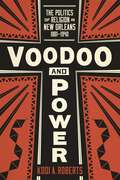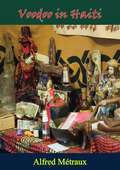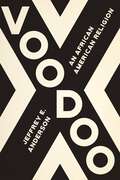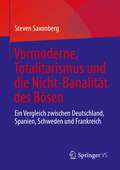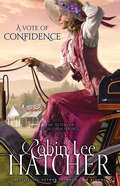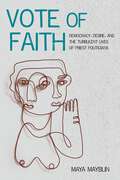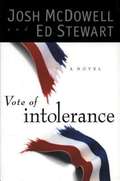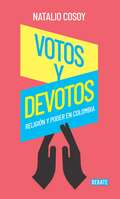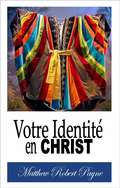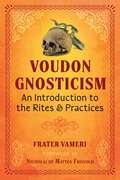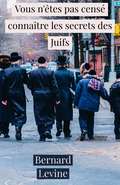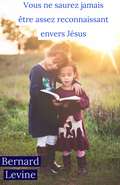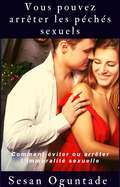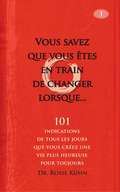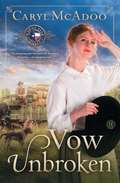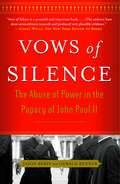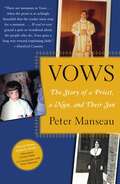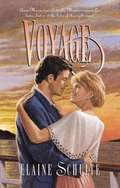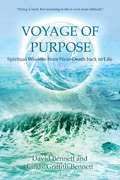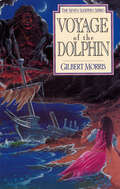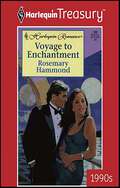- Table View
- List View
Voodoo and Power: The Politics of Religion in New Orleans, 1881-1940
by Kodi A. RobertsThe racialized and exoticized cult of Voodoo occupies a central place in the popular image of the Crescent City. But as Kodi A. Roberts argues in Voodoo and Power, the religion was not a monolithic tradition handed down from African ancestors to their American-born descendants. Instead, a much more complicated patchwork of influences created New Orleans Voodoo, allowing it to move across boundaries of race, class, and gender. By employing late nineteenth and early twentieth-century first-hand accounts of Voodoo practitioners and their rituals, Roberts provides a nuanced understanding of who practiced Voodoo and why.Voodoo in New Orleans, a mélange of religion, entrepreneurship, and business networks, stretched across the color line in intriguing ways. Roberts’s analysis demonstrates that what united professional practitioners, or “workers,” with those who sought their services was not a racially uniform folk culture, but rather the power and influence that Voodoo promised. Recognizing that social immobility proved a common barrier for their patrons, workers claimed that their rituals could overcome racial and gendered disadvantages and create new opportunities for their clients.Voodoo rituals and institutions also drew inspiration from the surrounding milieu, including the privations of the Great Depression, the city’s complex racial history, and the free-market economy. Money, employment, and business became central concerns for the religion’s practitioners: to validate their work, some began operating from recently organized “Spiritual Churches,” entities that were tax exempt and thus legitimate in the eyes of the state of Louisiana. Practitioners even leveraged local figures like the mythohistoric Marie Laveau for spiritual purposes and entrepreneurial gain. All the while, they contributed to the cultural legacy that fueled New Orleans’s tourist industry and drew visitors and their money to the Crescent City.
Voodoo in Haiti
by Alfred Métraux Hugo CharterisVoodoo in Haiti is a masterwork of observation and description by one of the most distinguished anthropologists of the twentieth century. Alfred Métraux has written a rich and lasting study of the lives and rituals of the Haitian mambos and adepts, and of the history and origins of their religion. It is an accurate and engaging account of one of the most fascinating and misunderstood cultures in the world."Métraux's book is a landmark in the serious study of Afro-Atlantic religion. The breadth and subtlety of its approach is such that it remains an essential classic of Afro-American ethnology."--Robert Farris Thompson, professor of art history, Yale University, author of Flash of the Spirit"This is a work deserving of wide readership, and assured of it by its understanding and appeal."--Library Journal"This book gives what is surely the most authoritative general account of that complex of belief and practice called vaudou available in the literature....No other observer of vaudou has contributed to its study the exquisite documentation of detail that marks the work of Alfred Métraux."--Sidney W. Mintz, professor of anthropology, Johns Hopkins University
Voodoo: An African American Religion
by Jeffrey E. AndersonDespite several decades of scholarship on African diasporic religion, Voodoo remains underexamined, and the few books published on the topic contain inaccuracies and outmoded arguments. In Voodoo: An African American Religion, Jeffrey E. Anderson presents a much-needed modern account of the faith as it existed in the Mississippi River valley from colonial times to the mid-twentieth century, when, he argues, it ceased to thrive as a living tradition.Anderson provides a solid scholarly foundation for future work by systematizing the extant information on a religion that has long captured the popular imagination as it has simultaneously engendered fear and ridicule. His book stands as the most complete study of the faith yet produced and rests on more than two decades of research, utilizing primary source material alongside the author’s own field studies in New Orleans, Haiti, Cuba, Senegal, Benin, Togo, and the Republic of Congo. The result serves as an enduring resource on Mississippi River valley Voodoo, Louisiana, and the greater African Diaspora.
Vormoderne, Totalitarismus und die Nicht-Banalität des Bösen: Ein Vergleich zwischen Deutschland, Spanien, Schweden und Frankreich
by Steven SaxonbergDieses Buch bietet eine vergleichende und historische Analyse des Totalitarismus und geht der Frage nach, warum Spanien während der Inquisition totalitär wurde, Frankreich aber nicht; und warum Deutschland im vergangenen Jahrhundert totalitär wurde, Schweden aber nicht. Der Autor verlegt das Konzept des Totalitarismus zurück in die Vormoderne und stellt Hannah Arendts Vorstellung von der Banalität des Bösen in Frage. Stattdessen stellt er einen alternativen Rahmen vor, der erklären kann, warum manche Staaten totalitär werden und warum sie Menschen zu bösen Handlungen verleiten.
Vote of Confidence
by Robin Lee HatcherIn A Vote of Confidence, the stage is set for some intriguing insight into what it was like during 1915 to be a woman in a “man’s world.” Guinevere Arlington is a beautiful young woman determined to remain in charge of her own life. For seven years, Gwen has carved out a full life in the bustling town of Bethlehem Springs, Idaho, where she teaches piano and writes for the local newspaper. Her passion for the town, its people, and the surrounding land prompt Gwen to run for mayor. After all, who says a woman can’t do a man’s job? But stepping outside the boundaries of convention can get messy. A shady lawyer backs Gwen, believing he can control her once she’s in office. A wealthy newcomer throws his hat into the ring in an effort to overcome opposition to the health resort he’s building north of town. When the opponents fall in love, everything changes, forcing Gwen to face what she may have to lose in order to win.
Vote of Faith: Democracy, Desire, and the Turbulent Lives of Priest Politicians (Catholic Practice in the Americas)
by Maya MayblinA richly cinematic and compelling look at priest-politicians in Brazil and their religious and secular entanglementsWhat does desire have to reveal about the nature of power? Through a detailed focus on the lives and loves of Catholic priests as they enter the profane world of party politics, Maya Mayblin explores the complex intersection of democracy, patriarchy, and religiosity in Brazil. For over a hundred years, Catholic priests have been running for government office, challenging Brazil’s constitutional separation of church and state and its self-image as a modern, secular nation. Priests find themselves walking a tightrope between religious and secular demands in one of Brazil’s poorest regions. Vote of Faith is a beautifully crafted ethnography based upon decades of fieldwork that tells the story of the ambiguous and frequently transgressive relationship between Catholicism and state governance, a relationship ultimately mediated by kinship, gender, and sexuality.For the protagonists of Vote of Faith, democracy becomes a sphere in which divine will and human ambition compete with one another, a tension embedded in the vernacular concept of faith. In the Brazilian context, faith signifies a complex set of assumptions about the nature of the world, assumptions derived not just from Christianity, but also from Afro-Brazilian and secular ideas about power, causation, and human agency. In combining ethnographic, theological, and feminist perspectives, Vote of Faith places desiring bodies at the very heart of Catholicism’s complex connection to multiple forms of power and offers provocative new angles on the question of the secular.The first work by an anthropologist to explore the unique phenomenon of the mayor-priest, this book offers an essential new angle on emerging debates about secularity as the condition of separation of the religious from the political. Brimming with originality, Vote of Faith is required reading for those interested in the gendered and sexual dimensions of the secular, the plasticity of religion, and the fundamental nature of the world’s largest religious institution.
Vote of Intolerance: A Novel
by Josh Mcdowell Ed Stewart(THIS SYNOPSIS IS QUOTED FROM THE LEFT AND RIGHT SIDE COVERS OF THE BOOK) “IN THE NOT-TOO-DISTANT FUTURE, the nation plummets toward moral bankruptcy as drugs, prostitution, and other deviant behaviors gain praise and legislative approval in state after state. Morally and culturally diverse California splits into two states, and the race for North California's first governor becomes a heated clash over the issues of tolerance and intolerance. Blaming the godless culture for the loss of her son and the demise of her marriage, Stevie Van Horne leaves Los Angeles with her two children for the promise of a better life in North California. She pours herself into the campaign to elect conservative Dan Bellardi as governor to establish a safe haven where Judeo-Christian values can flourish once more. But the move north leaves the children yearning for their father, friends, and familiar surroundings. Terrorist attacks, a cult seduction, and interference from her ex-husband tempt Stevie to forget her goal. She is determined to salvage her aikido from the encroaching culture. But to do so she must release the past, rethink her priorities and fully trust God for her future.”
Votive Panels and Popular Piety in Early Modern Italy
by Fredrika H. JacobsIn the late fifteenth century, votive panel paintings, or tavolette votive, began to accumulate around reliquary shrines and miracle-working images throughout Italy. Although often dismissed as popular art of little aesthetic consequence, more than 1,500 panels from the fifteenth and sixteenth centuries are extant, a testimony to their ubiquity and importance in religious practice. Humble in both their materiality and style, they represent donors in prayer and supplicants petitioning a saint at a dramatic moment of crisis. In this book, Fredrika H. Jacobs traces the origins and development of the use of votive panels in this period. She examines the form, context, and functional value of votive panels, and considers how they created meaning for the person who dedicated them as well as how they accrued meaning in relationship to other images and objects within a sacred space activated by practices of cultic culture.
Votos y devotos: Religión y poder en Colombia
by Natalio CosoyLa relación entre iglesia, Estado, política y poder en Colombia. Uno de los temas más debatidos luego de la derrota del plebiscito por la paz en 2016 fue la relación entre religión y política. Las comunidades religiosas están determinando las elecciones. El poder acumulado por los líderes católicos y cristianos ha desbordado los análisis políticos. Los vínculos entre creyentes e instituciones de la fe, entre el Estado y las de la sociedad en general, de las instituciones entre sí, no es ni ha sido estática: todos se han transformado por factores internos y externos, por sus interacciones a lo largo de más de dos siglos. Este libro es un intento por comprender el fenómeno comprendido en la relación entre religión y el poder, repasando su influencia en los orígenes de la nación, su rol en los conflictos internos del país, la relación entre líderes religiosos y políticos, la incidencia de la fe y sus ritos en la vida cotidiana y, por supuesto, el estado actual del vínculo religión, política y sociedad. Es un libro de sugerencias, de preguntas, que indaga esa complejidad que hay que asumir para pensar esta nación.
Votre Identité en Christ
by Matthew Robert PayneLorsque Jésus a été envoyé par le Père pour sauver le monde, il l'a fait non seulement pour les péchés que l'humanité a commis, mais aussi pour préparer tout le monde à marcher dans son monde et à prendre votre place légitime dans le Royaume du Père. Il nous a délivrés de la puissance des ténèbres et nous a conduits dans le royaume du Fils de son amour, en qui nous avons la rédemption par son sang, le pardon des péchés. La foi est incroyable, mais tout le monde ne comprend pas ce que cela signifie vraiment pour la vie d'une personne. Dans ce livre, Matthew Robert Payne partage non seulement ses expériences et ses défis dans ses efforts pour se trouver et sa place dans le monde chrétien, mais il possède des points de vue remarquables qui vous permettront d’évaluer votre compréhension antérieure des versets avec lesquels vous avez grandi. un chrétien. Le livre éclaire l'auditeur sur le vrai sens d'appartenir à la famille du Christ et le sens du pardon dans son intégralité. Il aborde le secret derrière vivre sans péché et la vraie relation avec Dieu. Marchez avec Matthieu et découvrez l'incroyable vérité de la grâce de Dieu. Est-il vraiment possible de ne pas pécher? Écoutez le livre audio et découvrez par vous-même. Entraînez-vous avec l'excitation de Matthew avec toutes les portes et les possibilités qui s'ouvriront une fois qu'une personne aura compris que chacune d'elles est choisie, royale, sainte et spéciale pour Dieu. L'impact de votre identité en Christ sur votre vie quotidienne sera merveilleux et vous aidera à vous libérer de toute honte ou de toute culpabilité que vous pourriez avoir dans votre vie de chrétien. Les chapitres sont courts, simples et faciles à identifier. Préparez-vous pour 19 chapitres d’une interprétation incroyable et surprenante du parcours d’un disciple du Christ.
Voudon Gnosticism: An Introduction to the Rites and Practices
by Frater Vameri• Analyzes the syncretic magical system of Voudon Gnosticism and the traditions from which it is sourced• Explains the practices of Voudon Gnosticism in detail, including how to speak with the Lwas (spirits) and establish relationships with them• Explores the history of Voudon Gnosticism and significant teachers like Martinez de Pasqually, Lucien François Jean-Maine, and Michael BertiauxThe Voudon Gnostic system—a unique melding of Haitian Vodou with Gnosticism, Martinism, and other traditions—is one of the most creative and rich ways to explore magic. Providing a comprehensive introduction to this complex magical tradition, Frater Vameri explores its history and practices, initiating novices and more advanced readers into his own Voudonist world and the tradition&’s conceptions of life and death.Vameri begins by exploring the founding and evolution of the system from its origins in Haiti to its séances in Chicago, including significant teachers such as Martinez de Pasqually, Lucien François Jean-Maine, Papus, and Michael Bertiaux. He looks at Voudon Gnosticism&’s early connections with Caribbean Martinist colonies, the Black Templars, Paschal Beverly Randolph, the Ordo Templi Orientis Antiqua, and the Hermetic Brotherhood of Luxor.The author explains how the lwas of Voudon Gnosticism are the same spirits found in traditional Haitian Vodou, yet approached differently. He explores how to learn to speak with the lwas, establish relationships with them, and profit from their revelations. He examines the Hoodoo system of the Voudon Gnosticism tradition and details how to build a Hoodoo altar as well as an atua, or spirit house, for adepts who have decided to establish enduring relationships with the spirits.Presenting a practical guide to this unique system, Vameri not only enables you to understand the history and intricate mechanisms of Voudon Gnosticism, but also reveals how to build your own magical universe with the help of Les Vudu.
Vous n'êtes pas censé connaître les secrets des Juifs
by Bernard LevineSaviez-vous que les Juifs n'ont pas le droit de déchirer le papier toilette le jour du Sabbat ? En quoi les relations sexuelles des Juifs sont-elles si différentes ? Pourquoi les Juives ne peuvent-elles pas lire une bible ? Est-il vrai qu'il n'y a pas de gros mots en Hébreu ? Savez-vous qu'il existe un Coca-Cola spécialement fabriqué pour les Juifs ? Quel est le nom de famille de Jésus ? Quelle lettre de l'alphabet est écrite à l'envers dans la Bible ? Voici le livre dont vous avez entendu parler et que personne ne veut que vous lisiez.
Vous ne saurez jamais être assez reconnaissant envers Jésus
by Bernard LevineAvez-vous déjà considéré le fait qu’un Roi mourrait pour vous ? Et pas n’importe lequel ! Mais le Roi des rois, Jésus Christ. La Bible est le seul livre dans lequel l’Auteur est omniprésent à chaque lecture !
Vous pouvez arrêter les péchés sexuels.: Comment éviter ou arrêter l’immoralité sexuelle
by Sesan OgunotadeCeci s’adresse aux adolescents et aux jeunes de tous sexes, aux hommes et femmes mariés (qui désirent être fidèles à leur conjoint), aux parents (qui cherchent un guide pour enseigner la pureté sexuelle à leurs adolescents à la maison), aux écoles et autres agences éducatives, ainsi qu’aux organisations religieuses.
Vous savez que vous êtes en train de changer lorsque...
by Dr Rosie Kuhn Martin FlorenceDe nos jours, la transformation est un gros marché. Elle est de partout. Mais qu'est-ce que c'est et comment savoir que cela vous est arrivé ? Voici 101 indications comme quoi vous êtes en train de changer et que vous êtes plus loin sur votre chemin spirituel que vous ne l'imaginiez.
Vow Unbroken
by Caryl McadooA spunky young widow hires a farmhand with a bad reputation to help her get her cotton to Jefferson to meet the wagon train, and sparks fly--but can she love a man who doesn't love the Lord?<P> Susannah Abbot Baylor reluctantly hires Henry Buckmeyer to help her along the Jefferson Trace, the hard stretch of land between her Texas farm and the cotton market, where she is determined to get a fair price for her crop. It's been a rough year, and she's in danger of losing the land her husband left to her and the children, but she'll need help getting both of her wagons to Jefferson safely. She knows Henry's reputation as a layabout and is prepared for his insolence, but she is not expecting his irresistible good looks or his gentle manner. Soon they are entwined in a romantic relationship that only gets more complicated when Susannah learns that Henry doesn't know God the way she does. Dangers arise on the road--but none as difficult as the trial her heart is going through. <P> Will Susannah and Henry's love overcome their differences? And will she get her crop safely to the cotton market with enough money to save the farm? In this heartening and adventurous tale, a young woman's fortitude, faith, and heart are put to the ultimate test.
Vows of Silence
by Jason Berry Gerald RennerGoing deep behind the headlines about scandals in the Catholic Church, Jason Berry and Gerald Renner's Vows of Silence follows the staggering trail of evasions and deceit that leads directly to the Vatican and taints the legacy of Pope John Paul II. Based on more than six years of investigative reporting and hundreds of interviews, this book is a riveting account of Vatican cover-ups. Both a profound criticism and a wake-up call to reform by two Catholic writers, Vows of Silence reveals an agenda of top-down control under John Paul II and a hierarchy so obsessed with secrecy as to spawn disinformation. It is not a book about sexual abuse; it is a book about abuse of power, throughout the Vatican. the Legion of Christ. One of the most mysterious and powerful men in the Catholic Church, Maciel has built a network of priests, lay people, and elite prep schools in more than twenty countries, using the Legion as a fundraising machine to position himself as a favored figure of John Paul II. In addition to accusations against Maciel of sexual abuse and of using Legion money for his own extravagant lifestyle, many ex-Legionaries claim that the order uses mind-control techniques to isolate seminarians and even priests from their families. And yet, because he enjoyed the protection of Pope John Paul II and members of the Roman Curia, charges against Maciel for sexual misconduct -- all of which he denies -- were blocked in the Vatican court system. Drawing on in-depth interviews with Father Doyle and with ex-Legionaries who filed a canonical suit against Maciel, as well as interviews with Vatican insiders and an array of sources in Mexico, Ireland, Canada, and Australia, the authors provide a penetrating account of a hierarchy directly in conflict with its followers. With keen insight and scrupulous reporting, Vows of Silence is a powerful narrative that chronicles the church's struggle between orthodoxy and reform -- going straight to the heart of one of the world's largest power structures.
Vows of Silence: The Abuse of Power in the Papacy of John Paul II
by Jason Berry Gerald RennerGoing deep behind the headlines about scandals in the Catholic Church, Jason Berry and Gerald Renner's Vows of Silence follows the staggering trail of evasions and deceit that leads directly to the Vatican -- and taints the legacy of Pope John Paul II. Based on more than six years of investigative reporting and hundreds of interviews, this book is a riveting account of Vatican cover-ups and the tumult they have caused in the church worldwide. Both a profound criticism and a wake-up call to reform by two Catholic writers, Vows of Silence reveals an agenda of top-down control under John Paul II and a hierarchy so obsessed with secrecy as to spawn disinformation. Vows of Silence is not a book about sexual abuse; it is a book about abuse of power, throughout the Vatican. The book cuts between the life story of Father Tom Doyle, who sacrificed a diplomatic career with the Vatican to seek justice for sex-abuse victims, and Father Marcial Maciel, an accused pedophile and founder of the militaristic religious order, the Legion of Christ. One of the most mysterious and powerful men in the Catholic Church, Maciel has built a network of priests, lay people, and elite prep schools in more than twenty countries, using the Legion as a fundraising machine to position himself as a favored figure of John Paul II. In addition to accusations against Maciel of sexual abuse and of using Legion money for his own extravagant lifestyle, many ex-Legionaries claim that the order uses mind-control techniques to isolate seminarians and even priests from their families. And yet, because he enjoyed the protection of Pope John Paul II and members of the Roman Curia, charges against Maciel for sexual misconduct -- all of which he denies -- were blocked in the Vatican court system. Drawing on in-depth interviews with Father Doyle and with ex-Legionaries who filed a canonical suit against Maciel, as well as interviews with Vatican insiders and an array of sources in Mexico, Ireland, Canada, and Australia, the authors provide a penetrating account of a hierarchy directly in conflict with its followers. With keen insight and scrupulous reporting, Vows of Silence is a powerful narrative that chronicles the church's struggle between orthodoxy and reform -- going straight to the heart of one of the world's largest power structures.
Vows: The Story of a Priest, a Nun, and Their Son
by Peter ManseauThe 1950s was a boom time for the Catholic Church in America, with large families of devout members providing at least one son or daughter for a life of religious service. Boston was at the epicenter of this explosion, and Bill Manseau and Mary Doherty -- two eager young parishioners from different towns -- became part of a new breed of clergy, eschewing the comforts of homey parishes and choosing instead to minister to the inner-city poor. Peter Manseau's riveting evocation of his parents' parallel childhoods, their similar callings, their experiences in the seminary and convent, and how they met while tending to the homeless of Roxbury during the riot-prone 1960s is a page-turning meditation on the effect that love can have on profound faith. Once married, the Manseaus continued to fight for Father Bill's right to serve the church as a priest, and it was into this situation that Peter and his siblings were born and raised to be good Catholics while they witnessed their father's personal conflict with the church's hierarchy. A multigenerational tale of spirituality, Vows also charts Peter's own calling, one which he tried to deny even as he felt compelled to consider the monastic life, toying with the idea of continuing a family tradition that stretches back over 300 years of Irish and French Catholic priests and nuns. It is also in Peter's deft hands that we learn about a culture and a religion that has shaped so much of American life, affected generations of true believers, and withstood great turmoil. Vows is a compelling tale of one family's unshakable faith that to be called is to serve, however high the cost may be.
Voyage
by Elaine L. SchulteYears after a dashing exchange student named Alex visits her home, Anne Marie inherits a ticket for a cruise to the homeland of the young Greek who is still dear to her heart. She looks forward to a renewed acquaintance and, perhaps, rekindled affection. But unknown to Anne Marie, Aunt Sylvia has also given away another ticket... to Jon Barnett, a handsome young attorney she’s loved like a son. And Anne Marie’s dream trip suddenly becomes a voyage of discovery. About herself. About love. About God. A pilgrimage that will forever change her life.
Voyage of Purpose
by David Bennett Cindy Griffith-BennettBy relating one man's amazing tale of triumph over death on multiple occasions, this book brings a fresh perspective to near death experience literature. David Bennett, once a brash young commercial diver whose personal philosophy was "cut your way through life to survive," was caught in a violent storm off the California coast one night where he drowned. While technically "dead," he met beings of light, relived his life, and peeked into his future, resulting in a complete paradigm shift for him. Later, he discovered he had stage IV lung and bone cancer-so advanced that his spine collapsed. Miraculously, he survived once again, and this second close call taught him even more about living, loving, and how to find purpose in his life. Voyage of Purpose brings readers right into the heart of the near-death experience, including the sensations of dying, being surrounded by the light, and meeting the Soul Family. Part memoir and part guide for achieving spiritual growth, this book shows how to integrate the most traumatic of incidents into one's spiritual path in order to live a more meaningful life.
Voyage of the Dolphin (Seven Sleepers Series #7)
by Gilbert MorrisHow lucky can they get? It's relaxation time, and the Seven Sleepers are vacationing on an ocean-going ship. How much trouble can they get into on vacation- none, right? Almost before they can sort out what's happening, Josh, Sarah, and their friends find themselves entangled with: a handsome sea captain who can't find a crew, a maddening rich girl who wants to be queen, a band of friendly and unfriendly giants, and the biggest hurricane of the century. But where is their powerful friend God? Does He know where they are? Does He even care? Sail along with Josh and the crew as they handle danger and fear, and see if you can figure out why God doesn't just rush to their rescue.
Voyage of the Dolphin (Seven Sleepers Series #7)
by Gilbert MorrisHow lucky can they get? It's relaxation time, and the Seven Sleepers are vacationing on an ocean-going ship. How much trouble can they get into on vacation- none, right? Almost before they can sort out what's happening, Josh, Sarah, and their friends find themselves entangled with: a handsome sea captain who can't find a crew, a maddening rich girl who wants to be queen, a band of friendly and unfriendly giants, and the biggest hurricane of the century. But where is their powerful friend God? Does He know where they are? Does He even care? Sail along with Josh and the crew as they handle danger and fear, and see if you can figure out why God doesn't just rush to their rescue.
Voyage to Enchantment
by Rosemary HammondPretty woman...It was the vacation of a lifetime and shy Melissa was determined to make the most of it. That meant throwing off her inhibitions once and for all and, like some modern-day Cinderella, transforming herself completely!But it seemed that famous author Miles Thatcher thoroughly disapproved of her innocent attempts to enjoy herself for once-although that didn't mean he was above stealing a kiss in the moonlight. He had absolutely no right to tell her what she could and couldn't do. Miles was no Prince Charming and after the end of their vacation they'd never see each other again, surely...?
Voyages in English 6
by Reverend Paul E. Campbell Sister Mary Donatus MacnickleEnglish language and grammar book for Catholic schools.
